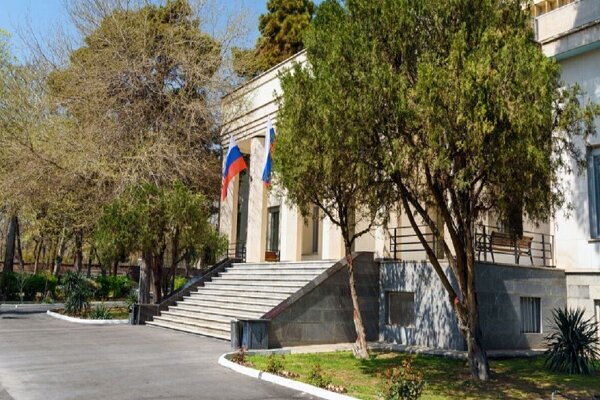Russian Embassy in Tehran condemns Wests antiIran actions at IAEA
Russian Embassy in Tehran condemns West’s anti-Iran actions at IAEA
TEHRAN – The Russian Embassy in Tehran has issued a statement criticizing the United States, the United Kingdom, Germany, and France for their recent actions in the Board of Governors of the International Atomic Energy Agency (IAEA).

Labeling these moves as both anti-Iranian and provocative, the embassy expressed serious concerns over a draft resolution targeting Iran's nuclear safeguards, describing it as part of a broader campaign to escalate tensions and deflect global attention from other critical issues, such as the ongoing crisis in Gaza.
According to the embassy, the resolution—initiated by the U.S., U.K., Germany, and France—is a deliberate effort to portray Iran as a primary threat in West Asia.
The Russian statement emphasized that this narrative is being pushed in disregard of these nations’ own non-compliance with international agreements, particularly UN Security Council Resolution 2231.
Moscow accused the four Western countries of abandoning their obligations under the Joint Comprehensive Plan of Action (JCPOA) and undermining efforts to revive the agreement.
The embassy highlighted the hypocrisy of the resolution's authors, suggesting they hope to obscure their role in the JCPOA's stagnation. By closely collaborating with Washington, the European signatories have, in Russia's view, systematically tarnished Iran’s image while shifting the blame for the nuclear agreement's failure entirely onto Tehran.
The embassy argued that had the JCPOA remained active, doubts about Iran’s nuclear program could have been resolved automatically. Instead, certain Western powers have chosen to exploit tensions for political gain, perpetuating baseless fears about Iran’s peaceful nuclear activities.
Russia categorically rejected the resolution, which received approval from only 19 of the 35 member states of the IAEA Board of Governors.
The embassy noted that a significant number of countries—representing the majority of the international community—either abstained or voted against the measure. Moscow views the resolution as counterproductive and misaligned with the true objectives of nuclear non-proliferation.
In its statement, the Russian Embassy argued that the resolution is aimed not at addressing genuine nuclear concerns but at disrupting the constructive engagement between Iran and the IAEA.
This disruption was particularly evident, the embassy claimed, as the resolution was circulated prior to the release of relevant IAEA reports and coincided with IAEA Director-General Rafael Grossi’s visit to Tehran. During his visit, Grossi met with senior Iranian officials and personally inspected nuclear facilities alongside agency inspectors.
The embassy expressed disappointment at what it sees as a Western aversion to improved cooperation between Tehran and the IAEA. According to Moscow, the "maximum pressure" policy spearheaded by Washington—dating back to the U.S. withdrawal from the JCPOA in 2018—has been destructive and counterproductive. Far from achieving its objectives, the policy has only served to heighten regional tensions and fuel unnecessary conflicts.
Russia called on the IAEA leadership to resist undue influence from countries driven by political agendas and anti-Iran sentiment.
Referring to Grossi’s remarks during his visit to Tehran, the embassy praised his emphasis on maintaining constructive dialogue with Iran.
Moscow expressed hope that the IAEA Director-General would continue along this path and disregard biased resolutions lacking legal and moral credibility.
In concluding its statement, the Russian Embassy reiterated its opposition to the Western nations’ actions, framing them as both legally dubious and diplomatically unhelpful.
Moscow urged the international community to adopt a balanced and fair approach toward Iran, warning that failure to do so risks perpetuating unnecessary conflict and undermining the credibility of international agreements and institutions.
source: tehrantimes.com